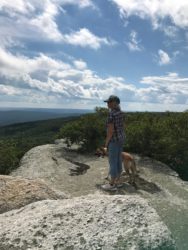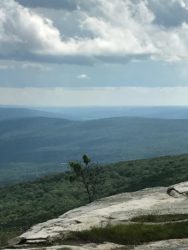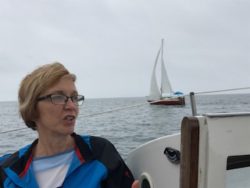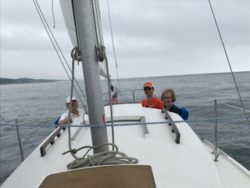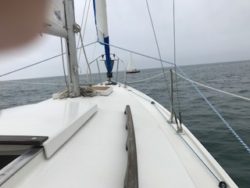The Bus Tour
I’ve done some unusual things during the course of my writing life, but my upcoming bus tour next month will be a first. The idea came from my friend Paul, who thought readers would enjoy touring some of the interesting sites from my novel, “Waves of Mercy.” The novel is set in the town of Holland, Michigan where Paul has lived most of his life, and it tells the story of the Dutch immigrants who founded the town in 1847. Paul happened to mention his idea to a friend from church who leads the 55+ Seniors’ Group—and the “Waves of Mercy” bus tour was born.
I imagined maybe a dozen of us climbing onboard the church van for a spin around town. Ha! I had no idea how popular this tour would be! The group has had to hire two chartered buses carrying 56 passengers each—plus the church van. The “Waves of Mercy” tour will begin at the church with a lunch of Dutch pigs-in-the-blankets and pea soup, then we’re off to see the sites. Here are just a few of them:
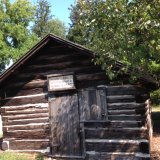
A typical settlers’ cabin from 1847
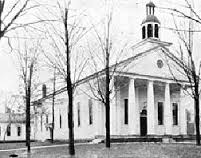 The first church built in 1856
The first church built in 1856
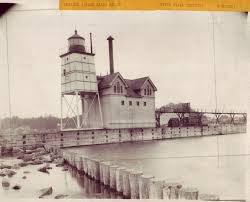 The original light house on Lake Michigan
The original light house on Lake Michigan
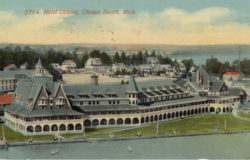 The Hotel Ottawa Resort on Black Lake
The Hotel Ottawa Resort on Black Lake
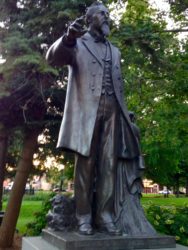 The town’s founding father, Rev. Albertus Van Raalte
The town’s founding father, Rev. Albertus Van Raalte
I’ve been trying to figure out what makes this tour so appealing to so many people. The sites we’re visiting aren’t unusual ones, but places that can easily be seen in Holland every day. I’ve concluded that it’s the settlers’ courage and faith that makes their story so compelling. They left their homeland of civilized cities to carve out a town in the wilderness because they longed for religious freedom. Their boat caught on fire and was delayed for repairs. The delay kept them from their goal and forced them to spend most of the winter in Detroit. They walked through knee-deep snow to reach the town site because there were no roads. They ran out of food and starved. Their first summer here, so many people died from malaria that they had to build an orphanage to house all the children. But they worked hard, cleared the land, and built farms and businesses. Then, only twenty-four years after the first settlers arrived, fire destroyed the town.
 I’m guessing that many of us would have given up—or at least questioned where God was in all these disasters. Had He really called us to settle here or not? It’s so easy to feel like our work is in vain when our carefully made plans start to fall apart. But the settlers’ faith remained strong. Today, there are more than 70 churches in this town of 33,000 people. What an example of perseverance and faith! If they had a life-verse, I think it would be this one:
I’m guessing that many of us would have given up—or at least questioned where God was in all these disasters. Had He really called us to settle here or not? It’s so easy to feel like our work is in vain when our carefully made plans start to fall apart. But the settlers’ faith remained strong. Today, there are more than 70 churches in this town of 33,000 people. What an example of perseverance and faith! If they had a life-verse, I think it would be this one:
“Therefore, my dear brothers, stand firm. Let nothing move you.
Always give yourselves fully to the work of the Lord,
Because you know that your labor in the Lord is not in vain.”
1 Corinthians 15:58
That verse will give us something to pause and think about on our “Waves of Mercy” bus tour.
- 5743
- 16
- 5

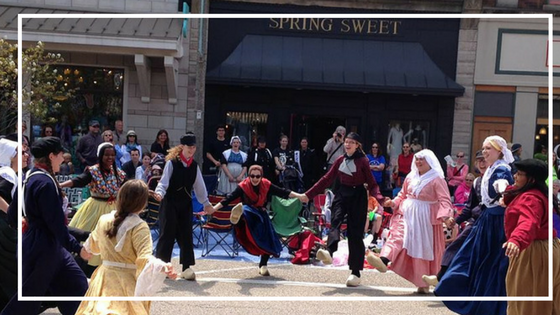

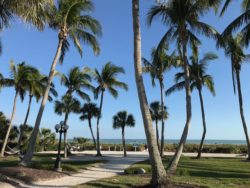 Our two-week vacation on
Our two-week vacation on  No one wants to hear news like that when they’re ten-thousand feet above the earth! As panic set in, I realized that I was utterly helpless to control any aspect of my life or my future. All I could do was pray—and of course, I did. Fervently! Everyone else must have been doing the same thing because the plane became eerily quiet. The next thirty minutes seemed like an eternity.
No one wants to hear news like that when they’re ten-thousand feet above the earth! As panic set in, I realized that I was utterly helpless to control any aspect of my life or my future. All I could do was pray—and of course, I did. Fervently! Everyone else must have been doing the same thing because the plane became eerily quiet. The next thirty minutes seemed like an eternity.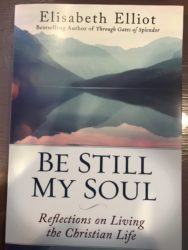
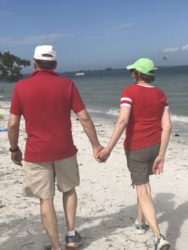

 I once heard a speaker compare life to a kayak trip downriver. Sometimes the waters are smooth and we can enjoy a leisurely journey, admiring the beauty all around us. But every now and then we hit the rapids and we’re suddenly thrown into a mad scramble to stay afloat. As we navigate past rocks and other dangers, overwhelmed with fear, we wonder if life will ever be serene and peaceful again. Eventually the river smooths out and we sail back into calmer waters. And if we’re wise, we will have learned some valuable lessons that can prepare us for the next patch of rough water. Here’s what I learned on last year’s voyage:
I once heard a speaker compare life to a kayak trip downriver. Sometimes the waters are smooth and we can enjoy a leisurely journey, admiring the beauty all around us. But every now and then we hit the rapids and we’re suddenly thrown into a mad scramble to stay afloat. As we navigate past rocks and other dangers, overwhelmed with fear, we wonder if life will ever be serene and peaceful again. Eventually the river smooths out and we sail back into calmer waters. And if we’re wise, we will have learned some valuable lessons that can prepare us for the next patch of rough water. Here’s what I learned on last year’s voyage: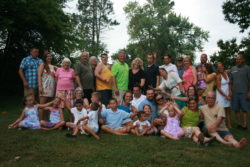 In my faith walk, I came into some challenging waters last year when our church hired a new lead pastor. He is a wonderful preacher, and our church has welcomed and embraced him. But he is challenging us to get out of our comfortable ruts so we can think more like Jesus and serve more like Him. I much prefer to float in a lagoon with people who are just like me—but Jesus longs for me to reach out to those who are different, those who may be drowning in the rapids, and offer them a helping hand. Yes, the comfortable ministries I’ve been involved with in the past have been good ones. But for the sake of the kingdom, it’s time for me to stop doing “church” and get involved with the world around me in the same way Jesus did.
In my faith walk, I came into some challenging waters last year when our church hired a new lead pastor. He is a wonderful preacher, and our church has welcomed and embraced him. But he is challenging us to get out of our comfortable ruts so we can think more like Jesus and serve more like Him. I much prefer to float in a lagoon with people who are just like me—but Jesus longs for me to reach out to those who are different, those who may be drowning in the rapids, and offer them a helping hand. Yes, the comfortable ministries I’ve been involved with in the past have been good ones. But for the sake of the kingdom, it’s time for me to stop doing “church” and get involved with the world around me in the same way Jesus did. My writing life has been mostly calm this past year. And yet . . . I have felt God challenging me not to settle for safe waters. As an act of trust, I need to take new risks and move out into deeper water. One way I’ve been doing that is by self-publishing an out-of-print novel of mine called “Fly Away.” It took a lot of work and required learning new things—and you know what they say about teaching old dogs new tricks! But a letter from a reader made it all worthwhile when she wrote to tell me how much “Fly Away” has blessed her. Why start a new venture when I’ve been successful with a traditional publisher? Why not stay in safe waters? Because sometimes complacency masks a lack of faith. I don’t like change—does anyone? Yet I know from experience that my faith grows the most during times of change.
My writing life has been mostly calm this past year. And yet . . . I have felt God challenging me not to settle for safe waters. As an act of trust, I need to take new risks and move out into deeper water. One way I’ve been doing that is by self-publishing an out-of-print novel of mine called “Fly Away.” It took a lot of work and required learning new things—and you know what they say about teaching old dogs new tricks! But a letter from a reader made it all worthwhile when she wrote to tell me how much “Fly Away” has blessed her. Why start a new venture when I’ve been successful with a traditional publisher? Why not stay in safe waters? Because sometimes complacency masks a lack of faith. I don’t like change—does anyone? Yet I know from experience that my faith grows the most during times of change. I wish I could see around the bend in the river at what lies ahead for 2018—but I can’t. So, I’m choosing to sail forward into the unknown, comforted by one of my favorite verses from Isaiah: “When you pass through the waters, I will be with you; and when you pass through the rivers, they will not sweep over you” (Isaiah 43:1-2). Bon Voyage!
I wish I could see around the bend in the river at what lies ahead for 2018—but I can’t. So, I’m choosing to sail forward into the unknown, comforted by one of my favorite verses from Isaiah: “When you pass through the waters, I will be with you; and when you pass through the rivers, they will not sweep over you” (Isaiah 43:1-2). Bon Voyage!
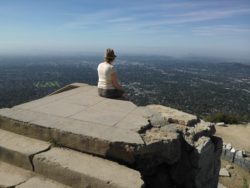

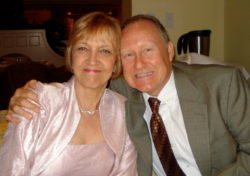


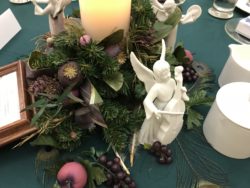
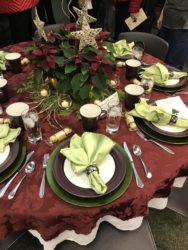
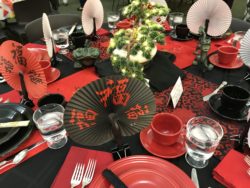
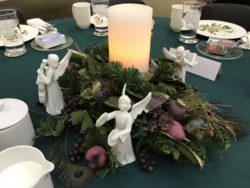
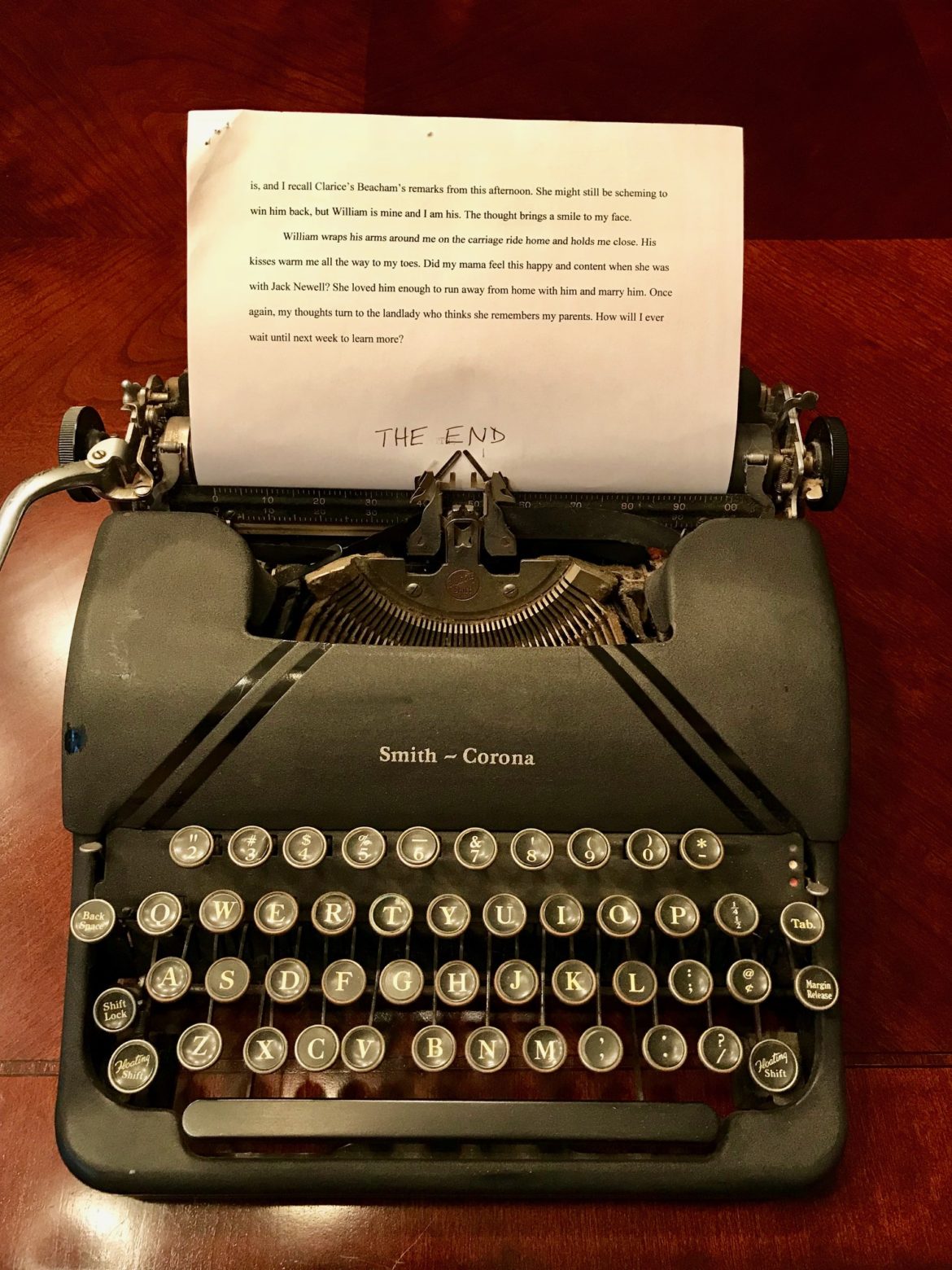
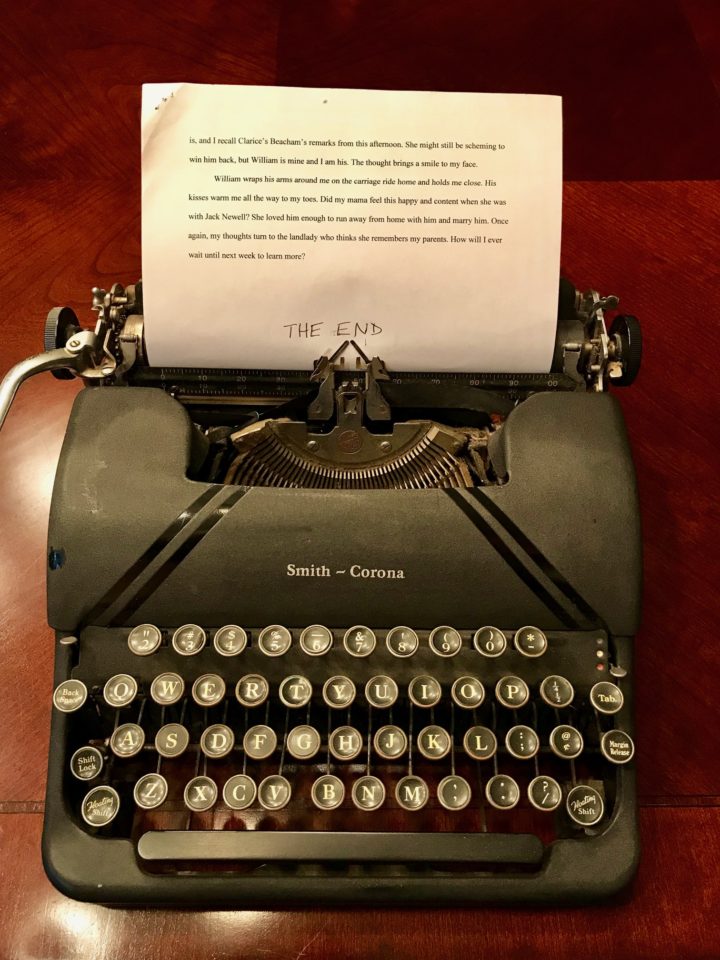 Two more chapters to write and I will be able to type those wonderful words—THE END. The novel I’ve been laboring on for nearly a year is almost finished. Maybe I’ll be able to enjoy the Christmas season with my family this year without stressing over my deadline. But when I tried to start my computer yesterday morning, eager to make the final sprint to the finish line, I discovered that it had crashed. An automatic update had failed, locking everything up. The fatal blue screen wouldn’t allow me access to my computer no matter how hard I tried. I did the only thing I knew how to do—I panicked!
Two more chapters to write and I will be able to type those wonderful words—THE END. The novel I’ve been laboring on for nearly a year is almost finished. Maybe I’ll be able to enjoy the Christmas season with my family this year without stressing over my deadline. But when I tried to start my computer yesterday morning, eager to make the final sprint to the finish line, I discovered that it had crashed. An automatic update had failed, locking everything up. The fatal blue screen wouldn’t allow me access to my computer no matter how hard I tried. I did the only thing I knew how to do—I panicked!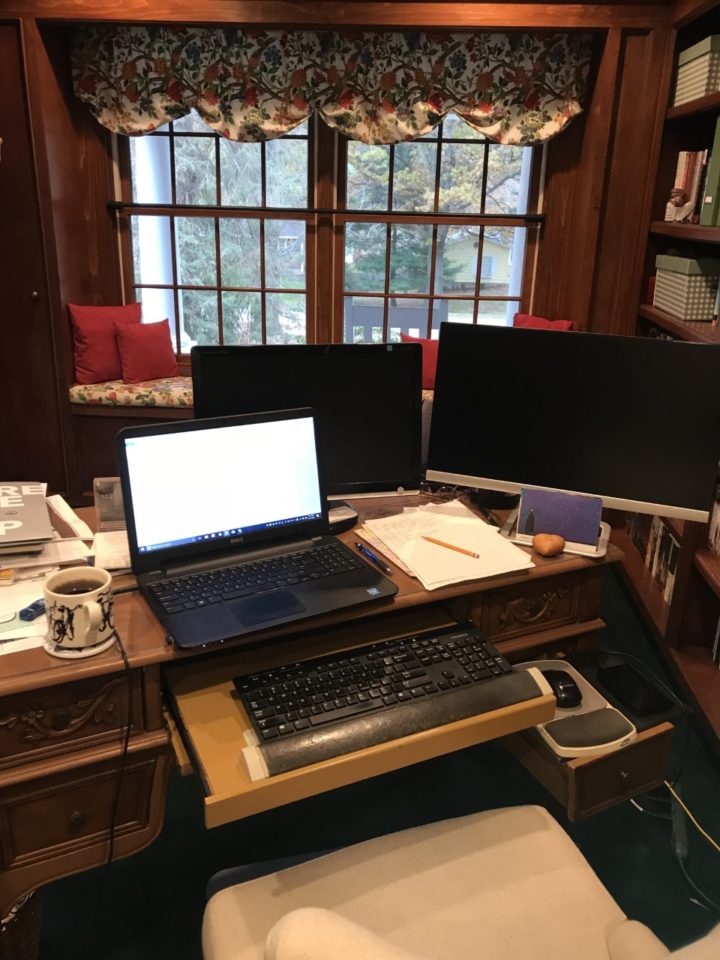 A crashed computer isn’t the only discouraging “glitch” I’ve experienced in my writing life these past few months. On the day of my book launch—a day I waited an entire year to celebrate—the book was unavailable on Amazon. Then I learned that the members of my Launch Team wouldn’t be receiving their advance copies of the book until more than a week after the launch date. And there were several other glitches, each one frustrating and worrisome and stressful. I call them “joy stealers.” Instead of the euphoria of another successful launch or a nearly completed novel, I’m wasting my energy stewing and worrying. Joyful? Not so much.
A crashed computer isn’t the only discouraging “glitch” I’ve experienced in my writing life these past few months. On the day of my book launch—a day I waited an entire year to celebrate—the book was unavailable on Amazon. Then I learned that the members of my Launch Team wouldn’t be receiving their advance copies of the book until more than a week after the launch date. And there were several other glitches, each one frustrating and worrisome and stressful. I call them “joy stealers.” Instead of the euphoria of another successful launch or a nearly completed novel, I’m wasting my energy stewing and worrying. Joyful? Not so much.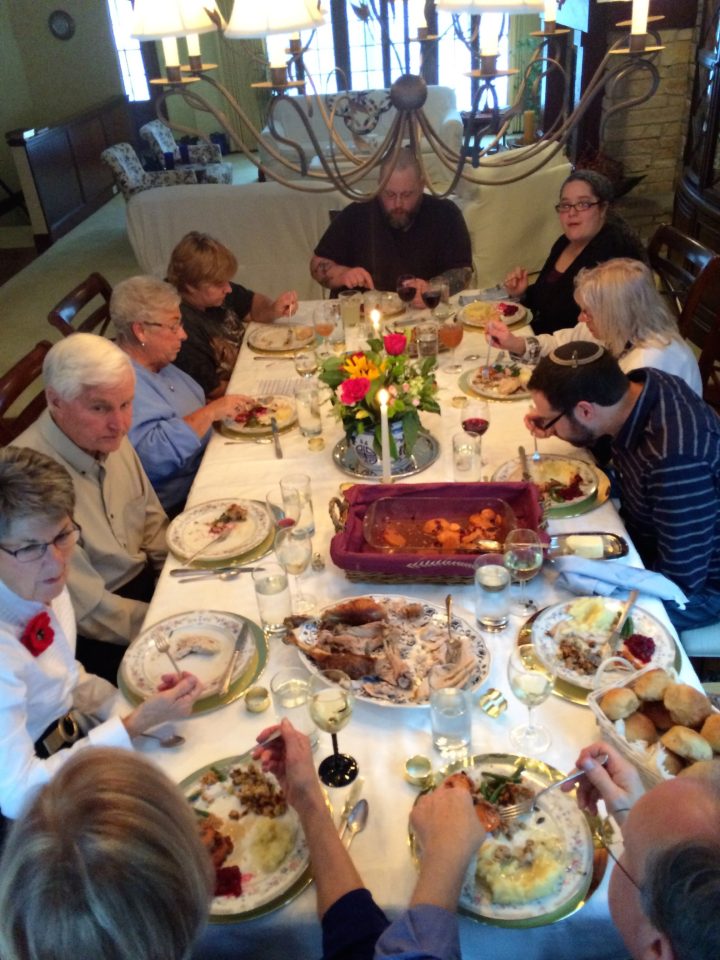 This week I will celebrate Thanksgiving with my family. It’s a yearly reminder to stand back and get some perspective on how God has so richly provided for us. Have there been “glitches” and “joy stealers” this year? Of course. But in the larger view of things, my family and I have been abundantly blessed. We could have been eating Thanksgiving dinner without my husband this year if a serious health issue a few months ago hadn’t ended well. Then there are our spiritual blessings, such as God’s grace and redemption and love. The security of our heavenly home. And a calling that I love in spite of the glitches.
This week I will celebrate Thanksgiving with my family. It’s a yearly reminder to stand back and get some perspective on how God has so richly provided for us. Have there been “glitches” and “joy stealers” this year? Of course. But in the larger view of things, my family and I have been abundantly blessed. We could have been eating Thanksgiving dinner without my husband this year if a serious health issue a few months ago hadn’t ended well. Then there are our spiritual blessings, such as God’s grace and redemption and love. The security of our heavenly home. And a calling that I love in spite of the glitches.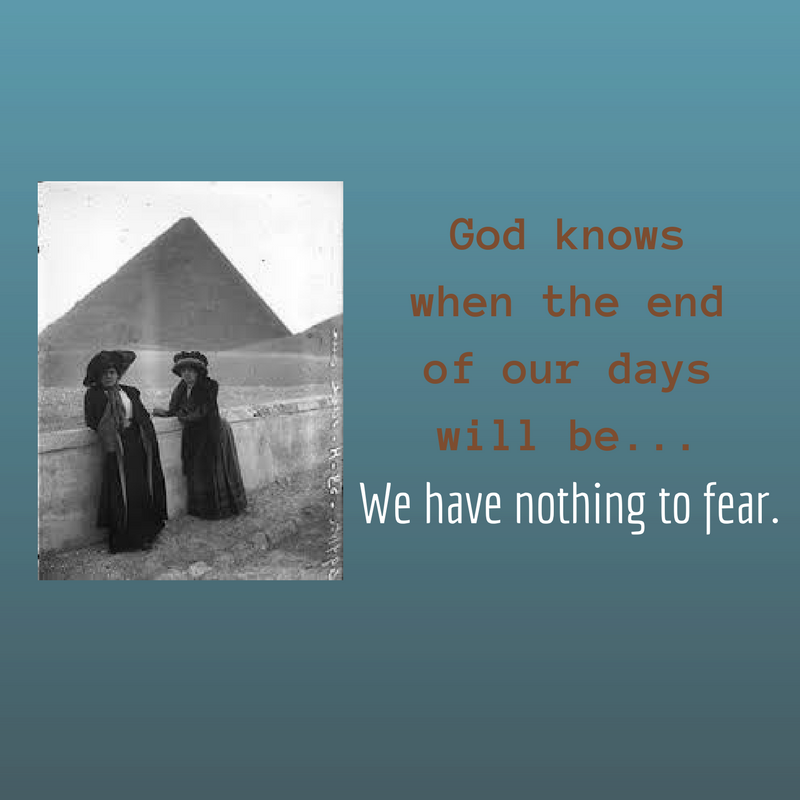
 The real-life sisters, Agnes and Margaret Smith, who inspired my newest novel, “Where We Belong,” had a favorite motto that continues to intrigue me. Whenever they were in danger or in a precarious situation they would say, “God knows when the end of our days will be. We have nothing to fear.” I borrowed their motto for my fictional sisters, Becky and Flora Hawes, to use whenever they found themselves in a sticky situation. I added a humorous twist to it in one scene when they are onboard a steamship during a ferocious storm at sea:
The real-life sisters, Agnes and Margaret Smith, who inspired my newest novel, “Where We Belong,” had a favorite motto that continues to intrigue me. Whenever they were in danger or in a precarious situation they would say, “God knows when the end of our days will be. We have nothing to fear.” I borrowed their motto for my fictional sisters, Becky and Flora Hawes, to use whenever they found themselves in a sticky situation. I added a humorous twist to it in one scene when they are onboard a steamship during a ferocious storm at sea:

 These are great verses to know the next time I’m in danger. But even more, I need to know the Savior who makes those promises. If I’m ever asked to take a courageous stand for my faith, as persecuted Christians in other nations do every day, I want to be fearless, knowing without doubt that the God I know and love is with me. He knows when the end of my days will be. I have nothing to fear.
These are great verses to know the next time I’m in danger. But even more, I need to know the Savior who makes those promises. If I’m ever asked to take a courageous stand for my faith, as persecuted Christians in other nations do every day, I want to be fearless, knowing without doubt that the God I know and love is with me. He knows when the end of my days will be. I have nothing to fear.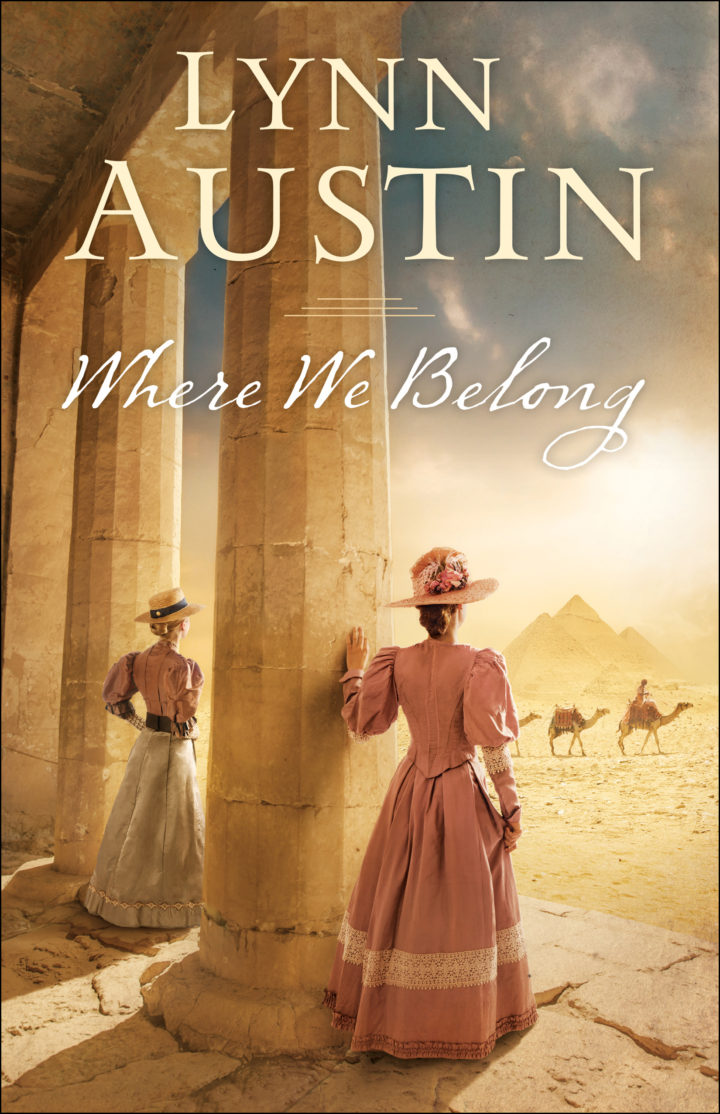

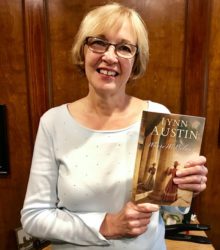
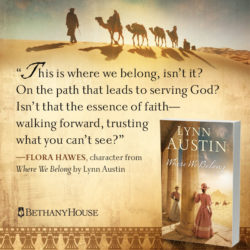
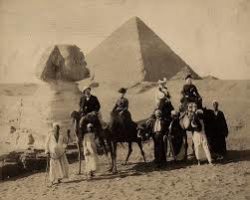

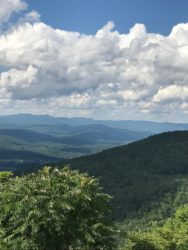 I just returned from a wonderful visit with my mother and my sister Peggy and her family in the little village in New York State where I grew up. The town is nestled in the Shawangunk Mountains, and seeing the mountains again is like seeing old friends. I always forget how much I’ve missed them while living in the flat Midwest. Peggy and I had a chance to go on several hikes while I was home, taking her new rescue dog, Franny, with us.
I just returned from a wonderful visit with my mother and my sister Peggy and her family in the little village in New York State where I grew up. The town is nestled in the Shawangunk Mountains, and seeing the mountains again is like seeing old friends. I always forget how much I’ve missed them while living in the flat Midwest. Peggy and I had a chance to go on several hikes while I was home, taking her new rescue dog, Franny, with us.

